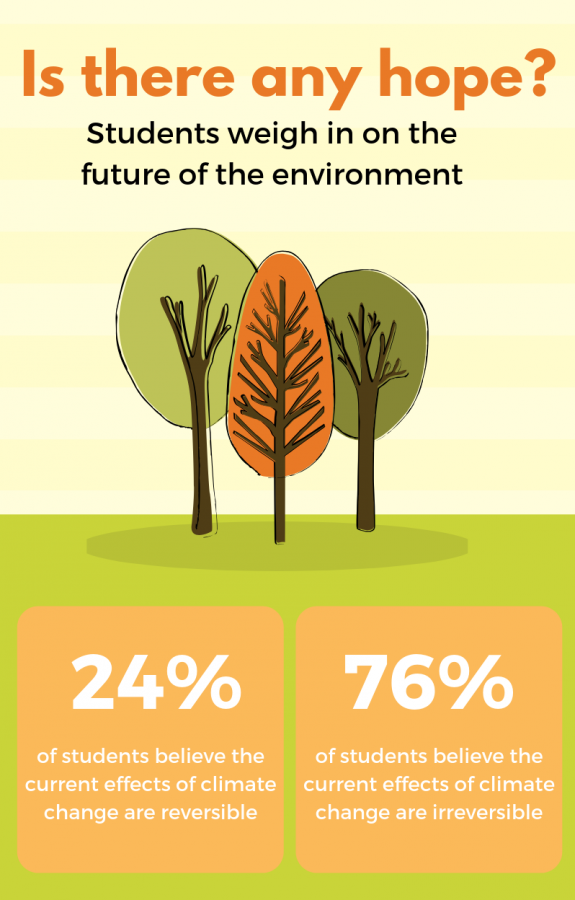The future we face: Climate change debate sparks controversy and concern
October 1, 2019
From raging forest fires and melting ice caps, to declining coral reefs and catastrophic hurricanes, natural disasters due to human interaction with the environment have put our lives and those of future generations at risk. Excess industrial waste, global climate change and wasteful daily habits have led some governments to step in and try to slow the rate of our planet’s deterioration. According to Briony Harris, senior writer for World Economic Forum, the Indian government has a plan to eliminate all single plastic usage by 2022. Some governments, like those of Morocco, Kenya and China, have taken the issue of plastic waste seriously, banning thin plastic bags, which constitute a large portion of global waste, altogether.
“Plastics take a thousand years to fully decompose, so every single thing that’s made of plastic still exists somewhere in the world,” senior Nicolas Bravo said.
However, many believe that American politicians are not doing enough to address the issue of plastic waste.
“Trump tried to release Trump 2020 plastic straws as merchandise, which is very harmful to the environment,” Bravo said.
The U.S.’ lack of action to preserve the environment doesn’t stop at plastic waste, it also extends into policy. Trump recently skipped out on the climate summit of the G7 conference on Aug. 26. According to Kevin Liptak, White House producer for CNN, Trump believed “climate change portions of the summit to be a waste of time compared to discussion of the economy.” Trump’s absence at the climate summit portion reiterates his stance of climate change being a hoax, revealed in several interviews and tweets, an attitude that many believe slows global progress in reducing climate change and limits American input in global agreements. Lack of U.S. action to reduce climate change isn’t new; since Trump was inaugurated, he removed the U.S. from the Paris Agreement, a contract consisting of 195 countries which aims to keep global climate temperatures from rising 2 degrees Celsius above pre-industrial levels.
Other countries present at the G7 session on climate change, like China, have been making strides in reducing carbon emissions.
“China is trying to reduce the amount of carbon they let in the environment,” Dulnev said.
In the 70s, China implemented a project, now known as the Great Green Wall. It is an ecological engineering effort that includes the planting of billions of trees along China’s northern border, adjacent to the desert. Approximately 66 billion trees have been planted, increasing the world’s forest by 10%, and this number can only rise as the project’s end date is scheduled to be in 2050.
According to Xianchun Tan and Henry Lee of the Belfer Center for Science and International Affairs at Harvard University, the U.S. per-capita emissions are almost double those of China.
Students have differing opinions on how the U.S. government should respond to climate issues, perhaps because they have contrasting views on the nature of climate change itself.
“I see climate change as a natural process,” senior Jakob Hemmerich said. “I think what governments should do, instead of making it harder for businesses, organizations and institutions to get by, is focus on conservatism.”
Several young people are taking matters into their own hands, such as 16-year-old Swedish activist, Greta Thunberg. Beginning in 2018, her movement protests the lack of government action in regulating the emission of greenhouse gases, inspiring other young people and schools around the world to take action as well. While some get involved in politics, others prefer to make changes in their personal lives.
“I drive an electric car and I’ve become more aware of my own usage of air conditioning and try to limit it because it’s not something that’s good for the environment,” Bravo said.
Some options are not nearly as expensive as getting an electric car. There are many simple and cost-effective ways to reduce the amount of waste and pollution we produce.
“I try to not use much plastic and use metal straws whenever I can,” Dulnev said.
Students aren’t the only ones trying to reduce their plastic usage; schools are trying to cut down on plastic too.
“I’m glad my school lunch doesn’t come with a straw, nor with plastic containers for vegetables,” Bravo said. “I think this is a great way to get rid of waste.”
The elimination of plastic containers and straws in FCPS school lunches is a step forward in reducing unneeded plastic waste and demonstrates the increased action the school system is taking to reduce plastic.
With such critical importance, the condition of the environment is central to our lives. Yet, no one can truly predict what the future holds. Some believe we’re doomed, while others are more hopeful and believe that we still have time to change.
“I don’t think we are doomed,” Dulnev said. “But the planet is in danger if we don’t do something quick.”


